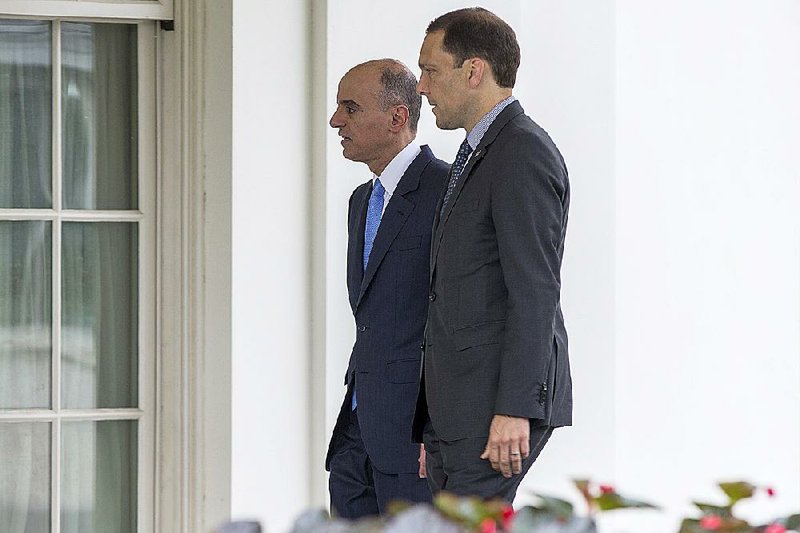WASHINGTON -- President Barack Obama made the case to Saudi Arabia's foreign minister Friday for the nuclear agreement with Iran that's unsettling the U.S.'s Persian Gulf allies.
Obama and Adel Al-Jubeir discussed a "range of regional and bilateral issues," including the Iran deal, at the White House, press secretary Josh Earnest said.
While Obama doesn't ordinarily meet with foreign officials who aren't heads of state, Earnest said, he saw Al-Jubeir at the request of Saudi King Salman. The White House meeting followed one Thursday between Al-Jubeir and Secretary of State John Kerry.
The Obama administration has been trying to ease the concerns of Shiite Iran's Sunni rivals in the Gulf about the agreement, which called for Iran to curb its nuclear program in return for the lifting of crippling economic sanctions.
After meeting with Kerry, Al-Jubeir said, "All of us in the region want to see a peaceful resolution to Iran's nuclear program." He added that "if Iran should try to cause mischief in the region, we are committed to confront it resolutely."
Gulf allies, led by the Saudis, have questioned whether Iran can be trusted to honor the accord and how it may use its newfound clout and revenue in a region ripped apart by sectarian conflicts. Many of the same concerns are being voiced by Israel, and by members of the U.S. Congress who will have 60 days to review the agreement before deciding whether to vote against it.
Secretary of Defense Ashton Carter plans to meet early next week in Israel with officials including Prime Minister Benjamin Netanyahu, an outspoken critic of the Iran deal.
Carter won't try to persuade Netanyahu to support the agreement he has staunchly opposed, but instead will use the visit to discuss ways to bolster U.S.-Israeli cooperation, prevent terrorist attacks and maintain Israel's "qualitative military edge" in weaponry, according to a U.S. defense official.
"Allied relationships bend," the official said of U.S.- Israeli ties. "They do not break."
The official spoke on condition of anonymity because he was not authorized to speak about the private talks.
The trip will include a visit to Israel's northern command near the Lebanese border, and a meeting with Moshe Ya'alon, Israel's defense minister.
Carter also plans to meet with Saudi officials in Jeddah, Saudi Arabia, to discuss ways to counter Iran's aggression in the region and the effort to defeat the Islamic State extremist group in Iraq and Syria, the official said.
As Congress opens its review of the deal, Obama is sending three Cabinet members involved in the issue to make the case on Capitol Hill next week.
Kerry, Energy Secretary Ernest Moniz and Treasury Secretary Jacob Lew will testify next week before the Senate Foreign Relations Committee on the agreement, which has drawn objections from lawmakers from both parties. House Speaker John Boehner, R-Ohio, said Thursday that the deal faces stiff opposition.
"It's pretty clear to me that a majority of the House and Senate, at a minimum, are opposed to this deal," Boehner said.
Many Republican lawmakers already have denounced the accord as inadequate, and a number of Democrats have said they're skeptical as well. Still, members would have to muster two-thirds votes in both chambers to reject the deal over Obama's veto.
Beginning a weekend blitz of television interviews to defend the accord, Kerry warned lawmakers Friday that a vote against the Iran deal may leave the U.S. largely helpless to curb that nation's nuclear program.
"If the United States Congress says no to this, the sanctions are gone, our inspections are gone, our knowledge of what they are doing will be gone, our support from the international community will be gone," Kerry said on MSNBC's Morning Joe program.
"Iran will be free to go out and do what they want, and we will have no recourse," he said.
Meanwhile, a group of more than 100 former American ambassadors wrote to Obama this week praising the nuclear deal as a "landmark agreement" that could be effective in halting Tehran's development of a nuclear weapon, and urging Congress to support it.
The signers, including diplomats named by presidents of both parties, wrote that they recognized the deal "is not a perfect or risk-free settlement of this problem."
"However," they added, "we believe that without it, the risks to the security of the United States and our friends and allies would be far greater."
Meanwhile, American Israel Public Affairs Committee, a powerful pro-Israel lobby, said Friday it is backing Citizens for a Nuclear Free Iran, a new political group that on Friday launched a multimillion-dollar campaign to oppose the nuclear pact.
Information for this article was contributed by Justin Sink, David Lerman, David J. Lynch, Holly Rosenkrantz, Nicole Gaouette, Billy House, Kathleen Miller and Donna Abu-Nasr of Bloomberg News; by Julie Hirschfeld Davis and Gardiner Harris of The New York Times; and by Deb Riechmann of The Associated Press.
A Section on 07/18/2015
